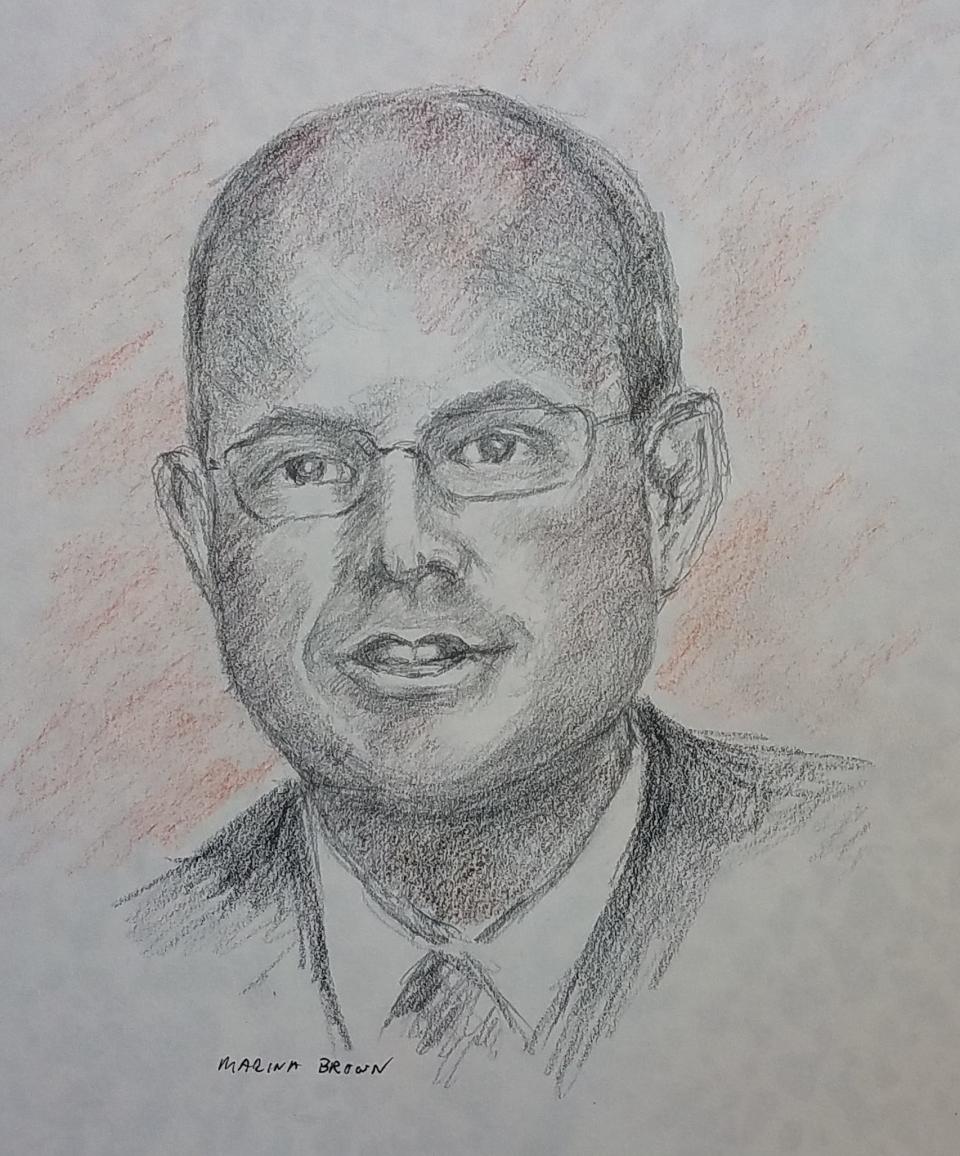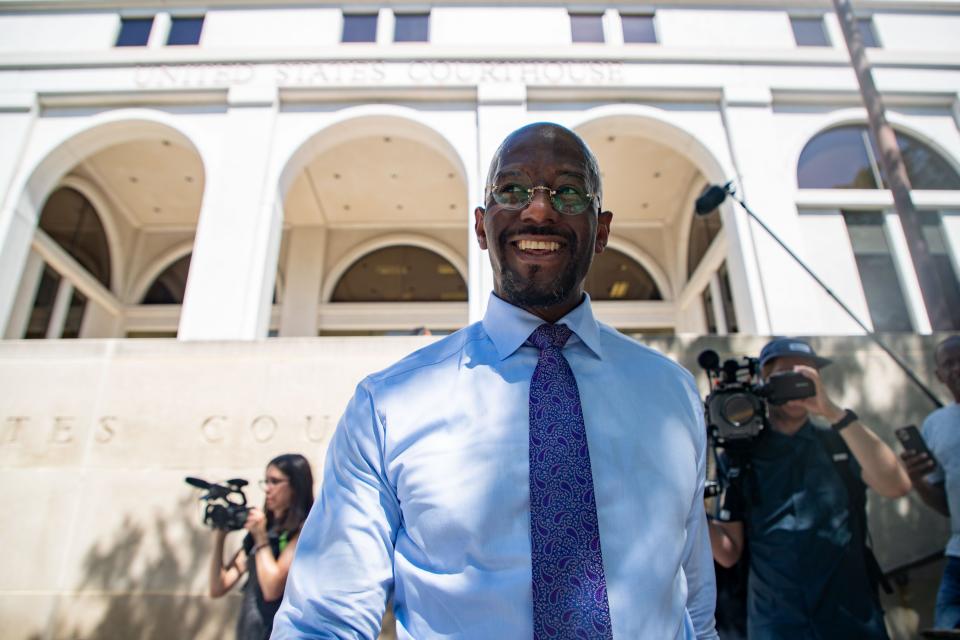'Rogue jurors' and what-ifs: Defense lawyers dish on Andrew Gillum case in podcast
- Oops!Something went wrong.Please try again later.
The pair of Miami lawyers who successfully defended Andrew Gillum on federal fraud charges revealed juicy details about the case, their battles with the judge and the “crazy” behavior of a couple of holdout jurors in a recent podcast episode.
David Markus and his law partner Margot Moss also pondered an alternate universe in which the feds hadn’t “targeted” Gillum with an investigation that made headlines during his 2018 run for Florida governor. Gov. Ron DeSantis, who hammered him on the corruption issue, edged out Gillum by less than 33,000 votes.
After a two week trial and nearly five days of combative jury deliberations, the former Tallahassee mayor was acquitted on a charge of lying to the FBI about gifts undercover FBI agents gave him during a 2016 meet-up in New York, including tickets to “Hamilton” and a boat ride in the harbor.
The jury deadlocked on a conspiracy count and 17 wire-fraud counts against both Gillum and his co-defendant and longtime friend and adviser, Sharon Lettman-Hicks. The charges involved allegations that Gillum and Lettman-Hicks funneled campaign donations to themselves.
Shortly after the trial ended, a group of jurors took an extraordinary step — writing the court to say most of them wanted to acquit on all charges but that two holdouts in the jury room refused to budge.
Federal prosecutors, who signaled after the verdicts were read that they would likely retry both defendants, relented 11 days later, moving to dismiss on all remaining counts. U.S. District Judge Allen Winsor granted the request.
Markus, host of his “For the Defense” podcast, invited Moss on the show for the season-closing episode, which dropped Sept. 12. Here are a few highlights:
Defense lawyers sparred constantly with the judge over race and other issues
Markus said he and his partner “butted heads” repeatedly with U.S. District Judge Allen Winsor, an appointee of former President Donald Trump who was confirmed to the federal bench in 2019.
Winsor ruled against their motion to try Gillum and Lettman-Hicks separately, which Moss called “outrageous.” He repeatedly clashed with the defense over the false statements count, which Markus was confident he would win on any appeal.
“I’m only guessing here,” Moss said, “but I think there was just such animosity toward our client, just wanting our client to get convicted and trying to get that done at all costs. It ended up being this really hostile atmosphere.”
During Moss’ opening statement, she showed the jury a photo of Gillum and his family and talked about his childhood as a “nerdy little kid” who watched C-SPAN and idolized Congresswoman Maxine Waters.
“I think the judge absolutely hated all of that stuff about Andrew and hated my whole opening and hated me,” Moss said.
She also said in her opening that Gillum was “innocent” and that the case was about “what happens when you put a target on someone’s back.”
“We believed this was the government going after a Black politician who was innocent,” she said. “And we knew we couldn’t say that in the opening — that the judge would jump up and down about that. So we used the word ‘target.’ ”

That didn’t sit well with Winsor. After her opening, Markus and Moss said he instructed them to refrain from saying the word “target” again.
“This case is going to be tried on facts and evidence, not about whether someone grew up poor or whether they were inspired by somebody,” Winsor said in open court.
“I never really had this before, where a judge like gave me rules about what I was allowed to say and not say before closing,” Markus said in the podcast months later. “One of the things he really harped one is that we couldn’t use the word ‘target’ anymore. After your opening, we couldn’t even suggest there was race involved.”
Prosecutors vehemently denied race was a factor in court filings, noting that the same FBI probe that led to charges against Gillum and Lettman-Hicks produced earlier convictions against former Tallahassee Mayor Scott Maddox and two other white defendants.
The defense told Andrew Gillum to brace for a guilty verdict after notes from jurors
Markus and Moss praised the jury — with the exception of two holdouts who were in favor of guilty verdicts on the conspiracy and fraud counts. The jury of 12 jurors and three alternates consisted of nine women, six men and five African Americans.
“I think it was the best jury we ever had in a trial other than the two random ones ... who were just rogue jurors,” Markus said. “But the other 10 were incredible people.”

Markus said race was a “really important” factor in the case “especially in a trial like this” and gave prosecutors credit for not striking Black jurors.
After closing arguments, the jury struggled for days to try to reach consensus. They sent a myriad of notes to the judge — some from individuals jurors rather than the foreperson, which was unusual. At one point, a juror told the court that the jury had decided to convict on the false statements charge.
“They sent us this note where we thought the jury had convicted on Count 1, the false statements count, because they said can we convict if we only find one of the statements false,” Markus said. “And we were so heartbroken. But it turns out that that was one of the crazy jurors who sent the note.”
Markus said that based on the notes the jury was sending, he was “100% sure” that the jury would convict Gillum on the false statements charge and Lettman-Hicks on wire fraud charges.
“I told R. Jai and Andrew to prepare for guilty verdicts,” Markus said. “I even said I think the judge might take you in because of how he was was, even though the prosecutors I don’t think would ask for it. And I was really down.”
Moss, who said she was a little more hopeful, noted that both Gillums started to cry after the jury announced “not guilty” on the false statements count. She and another lawyer on their team also got emotional.
“There’s no feeling like it,” Markus said, “especially in this case where we believed out client was innocent. I can’t describe the feeling because if you haven’t experienced it, you just don’t know what it’s like. It’s honestly the greatest and most rewarding feeling and the reason we do it.”
Lawyers said Florida, the nation would be in 'different place' were it not for the FBI probe and Gillum's gubernatorial loss
Markus opened the episode with audio from the final gubernatorial debate of 2018 and Gillum responding to a question about the “Hamilton” tickets. Gillum, conjuring Jay-Z lyrics, memorably quipped that in Florida, “We got 99 issues and ‘Hamilton’ ain’t one of them.’ ”

“I absolutely love that answer by Andrew Gillum in the gubernatorial debate right before the election against Ron DeSantis,” Markus said. “Had this unwarranted investigation not been leaked right before the election, he would be our governor. Our whole state — our whole country — may be in a different place.”
The FBI probe became public knowledge in mid-2017, after grand jury subpoenas dropped on City Hall. That June, Gillum acknowledged he had been interviewed by the FBI, a conversation that would haunt him years later in the form of the false statements count. Days before the general election, a lawyer for Gillum’s former friend Adam Corey released volumes of records involving the FBI investigation.
Later in the podcast, Markus said the investigation itself cost Gillum the contest.
“In a lot of ways, this case makes me so angry because had they not put a target on his back, he would have been the governor of Florida and our country might be in a different place,” Markus said. “Still thinking about it makes my blood boil.”
Moss agreed: “It’s so outrageous and disappointing, and we would definitely be in a much better place if Andrew had become governor.”
Gillum, who had become a sought-after pundit on cable news after his gubernatorial defeat, retreated from politics following an incident in 2020 when he was found in a Miami Beach hotel room with a male escort who had overdosed on drugs. Aside from fundraising appeals for his legal defense, he has maintained a fairly low profile since the trial ended. But Markus said he hopes that changes.

"It was such an honor to represent Andrew Gillum, an innocent man," Markus said. "And I hope this case restarts his political career. We need him in politics."
Contact Jeff Burlew at jburlew@tallahassee.com or 850-599-2180.
This article originally appeared on Tallahassee Democrat: Andrew Gillum case: Defense lawyers pull back curtain in podcast

